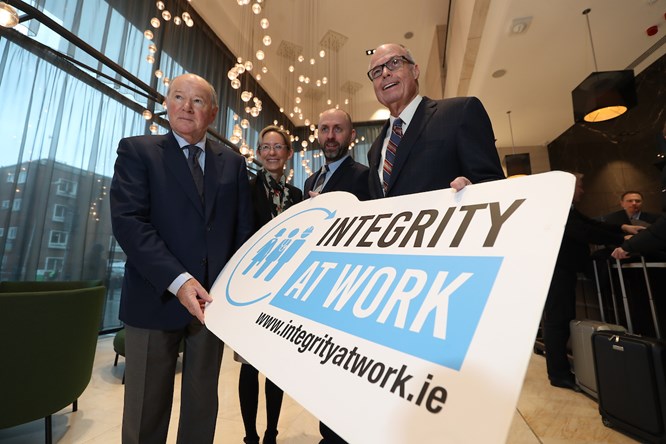
Integrity at Work Conference 2019 - Insights on Ethical Leadership
The Whistleblowing International Network (WIN) is delighted to post this piece by Stephanie Casey, Integrity at Work Programme Manager at Transparency International Ireland, a Member of WIN.
As whistleblowing is better understood as a matter that should be addressed in a framework of ethics and business priorities that serve the public good, events such as this latest conference in Dublin are attracting business and government leaders alike - to focus on what makes whistleblowing work for all.
‘We all need to speak up. That is how we change individual companies and their entire culture.'
This was the message of Richard Bowen, keynote speaker at the Integrity at Work Conference in Dublin, last month. The aim of the conference, organised by Transparency International Ireland as part of the Integrity at Work initiative, was to explore how to promote ethical behaviour in the workplace.
Bowen was speaking from personal experience. As a Business Chief Underwriter for Citigroup before the 2008 financial crisis, he saw fraud first-hand inside the organisation. He discovered that billions of dollars of defective mortgages were being sold to securitisation investors as quality mortgages. Bowen tried to speak up to bosses and to the authorities, but his warnings were ignored. Citigroup eventually stripped him of all responsibilities and told him his presence was no longer required at the bank.
The irony of Bowen’s experience is that he was working in an organisation that publicly championed ethics. Elaborate initiatives including a “Five Point Ethics Plan” and a comprehensive ethics policy had been established. So, why was fraudulent behaviour still being ignored? In Bowen’s own words, ‘We can “talk” culture all day long, mandate it, instil fear of firing, but if leadership is not an example and role model for ethical behaviour… well it’s not going to happen’.
The need for ethical leadership was a recurring theme at the conference. Amanda Shantz, Associate Professor of Human Resource Management, Trinity Business School, explored the topic with reference to her award-winning research, ‘Building an Ethically Strong Organisation.’ Her findings indicate that organisations must invest in ‘distributed’ ethical leadership in order to foster an ethically strong environment. In other words, they must hire and cultivate leaders at all levels who promote ethical behaviour.
In an ethically strong environment, employees are more likely to raise concerns. ‘Ethically strong organisations explicitly say how people should deal with ethical breaches when they do occur, in addition to trying to prevent them in the first place. Employees at all levels then feel more empowered — and obliged — to call out bad behaviour, even when doing so may be difficult’, says Shantz.
Referring to Muel Kaptein’s model of corporate ethical virtues, Dr Wim Vandekerckhove, from the University of Greenwich, highlighted four virtues that are key to developing ethical behaviour in organisations:
-
Clarity: Clearly articulate the ethical expectations and shared values of the organisation.
-
Feasibility: Ensure that adequate resources are put into this area and that management and staff are equipped to fulfil their responsibilities;
-
Sanctionability: Managers and staff need to believe that unethical behaviour will be punished, and that ethical behaviour will be rewarded. Furthermore, organisations need to demonstrate that they have learned from past mistakes.
-
Discussability: Managers and staff should be given opportunities to raise and discuss ethical dilemmas and alleged unethical behaviour.
Central to the wider discussion was the whistleblower narrative. In the news media, reports of whistleblowing often focus on scandal, job losses and retaliation. Such negative stories can discourage people from speaking up. According to Kate Kenny, Professor of Business and Society at National University of Galway, organisations should change perceptions by publicising cases where whistleblowing has a positive outcome. ‘If we want people to come forward, we need to conquer hearts and minds; employers must endeavour to share the success stories of those who speak up’.
The insights shared by speakers and employers at the Integrity at Work Conference demonstrated that fostering an ethical workplace takes time, effort and - above all - commitment.
For more information on the Integrity at Work Programme, see here.
If you would like to highlight your whistleblowing events or activities on the WIN website, please drop us a line on info@whistleblowingnetwork.org